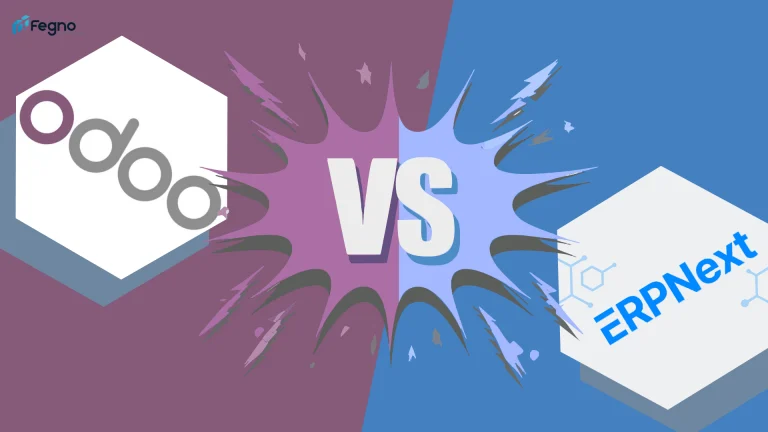
Running a growing business means juggling sales, inventory, accounting, and more. An ERP (Enterprise Resource Planning) system is the backbone of business operations that ties everything together. If you’re a small or mid-sized company looking to streamline processes and scale smartly, open-source ERPs like Odoo and ERPNext are the best choices, offering powerful features without a heavy price.
But which one is right for you? Both are excellent, but they serve different needs. This guide explores their strengths and weaknesses, highlights what you need to look out for and helps you decide.
Odoo vs ERPNext — Quick Comparison
Short comparison of ERPNext and Odoo features to help SMEs decide between the two open-source ERPs.
| Feature | Odoo | ERPNext |
|---|---|---|
| Modules | 40,000+ apps, broad industry coverage | Core modules, fewer extensions |
| Customization | Highly flexible with APIs & add-ons | Customizable but fewer integrations |
| Cost | Community free; paid Enterprise tier | Open-source; pay mainly for hosting/support |
| Deployment | Cloud, on-premise, Odoo.sh | Cloud or on-premise |
| Best for | Growing businesses with complex needs | SMEs with standard workflows |
| Strengths | Scalable, rich modules, strong partner network | Easy setup, low cost, quick to implement |
| Weaknesses | Can be complex and pricey when heavily customized | Smaller ecosystem, limited advanced modules |
| Support | Large global partner network | Active open-source community |
What is Odoo?
Think of Odoo as a Swiss Army knife for your business. It’s a modular system where you can start with one app (like CRM or Inventory) and add more as you grow. Its biggest strength is its modern, polished user interface that teams find easy to adopt.
Strengths of Odoo
Modular Architecture: You can pick modules like CRM, eCommerce, Manufacturing, POS, Accounting and grow over time.
Broad Integrations: With an established ecosystem and many third-party apps, Odoo works well if you need advanced features or custom workflows.
Scalable for Growth: If your business plans to expand, multiple locations or become more complex, Odoo fits well.
Big Partner/Community Network: Easier to find consultants, developers, and extensions.
Weaknesses & Considerations
It could be more expensive when you scale or require many custom modules.
Larger feature set = steeper learning curve.
Requires good Odoo implementation support to get the most value.
Choosing the right ERP is only half the journey. The real success lies in how it’s implemented. As an experienced Odoo implementation partner in Kerala, we ensure that every stage — from module selection and customization to integration and training aligns with your business goals. We combine technical expertise with a deep understanding of Kerala’s business ecosystem, helping companies transform operations and achieve measurable growth through smart Odoo solutions.
What is ERPNext?
If Odoo is a Swiss Army knife, ERPNext is a powerful, reliable multi-tool. It’s designed as a more unified, monolithic system where all core modules are deeply integrated from the start. It is renowned for its strong accounting and inventory foundations.
Strengths of ERPNext
Deep, Native Integration: All core modules are built to work seamlessly together, often leading to a more cohesive data flow.
Accounting-First Approach: Its robust, double-entry accounting system is a core strength, making it a favorite for finance-heavy businesses.
Simpler, Faster Setup: Because it’s more unified, initial implementation can be more straightforward than Odoo’s modular setup.
Strong Core Manufacturing: Offers capable production planning and shop floor management out-of-the-box.
ERPNext Weaknesses & Considerations
It may become limiting if you expand significantly or need niche modules/integrations.
Smaller community and fewer plugins compared to Odoo.
The UI is functional and practical but feels less modern and polished compared to Odoo.
What a Small/Medium Business Should Consider
If you’re local, relatively simple workflows, ERPNext might be enough. If you plan regional/national growth, many modules and integrations, Odoo might be a better choice.
Odoo vs EPRNext: A Detailed Comparison
For User Experience & Adoption, Choose Odoo. Its intuitive and aesthetically pleasing interface is a major advantage for ensuring your team actually uses the system. ERPNext’s interface is utilitarian and has a steeper learning curve.
Accounting & Finance – ERPNext. For businesses where accounting is the absolute heart of operations, ERPNext’s comprehensive, GAAP-compliant accounting module is often considered more robust out-of-the-box.
Customization & Scalability: It’s a Tie, But Different. Both are highly customizable. Odoo’s modularity allows for flexible growth, but it can get complex. ERPNext offers deep customization of its core system, which can be more straightforward but less piecemeal.
Implementation & Cost: Odoo’s Community Version is more visually appealing, whereas ERPNext’s offers more advanced operational features, making both powerful options for users looking for free versions. In terms of enterprise versions, Odoo’s pricing is structured per user and per module, which can accumulate significantly, while ERPNext is often recognized for its more predictable and affordable pricing model, particularly benefiting small and medium-sized businesses.
The Final Verdict: Which One Should You Choose?
The best choice depends entirely on what your business values most.
Choose Odoo if:
- User adoption and a modern interface are your top priorities.
- Your business is sales and marketing-driven.
- You prefer a modular approach, starting with a few apps and scaling over time.
- You have the budget for the Enterprise version to unlock advanced features.
Choose ERPNext if:
- Robust accounting, inventory, and core operational management are your primary needs.
- You prefer a unified system with deep integration from day one.
- You are budget-conscious and need advanced features in the free community edition.
- Your team is more technically adaptable and can handle a less-polished UI.
Regardless of choice, pick a partner who can implement well and support you long term—your ERP is a business foundation, not just a software purchase. As one of Kerala’s best software development companies, Fegno helps businesses build efficient, scalable ERP systems along with web development, mobile app solutions, PWA development, UI/UX design, and digital marketing, that truly support their growth.
Still unsure? Think of it this way: If you want an ERP that your sales team will love and that looks great, lean towards Odoo. If you need a rock-solid operational backbone with exceptional accounting, ERPNext might be your smarter choice.

 Schedule An Appointment
Schedule An Appointment